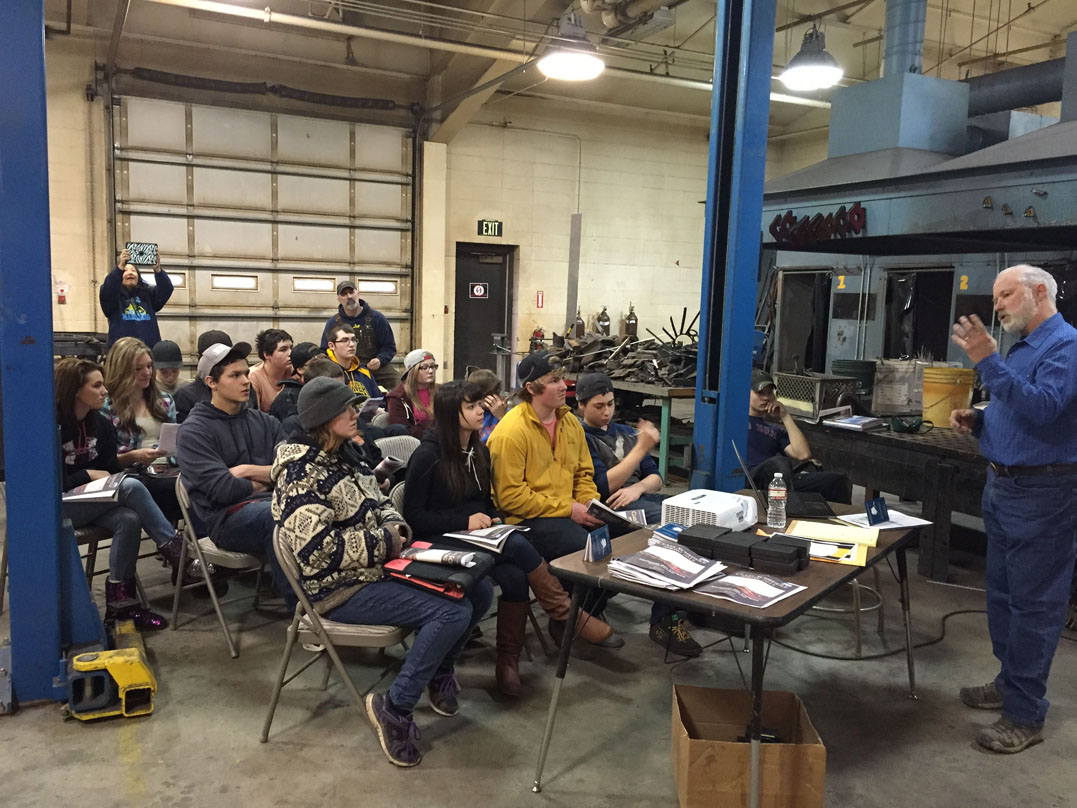With 60 percent of the nation’s seafood harvested and processed right here in Alaska and with more than 47,000 miles of coastline, it makes sense that the marine sector would offer thousands of jobs.
Make that 70,000, according to the state’s “Alaska Maritime Workforce Development Plan.”
Those jobs include opportunities in seafood processing and harvesting; fisheries research, enhancement and management; and the marine occupations and support industries, such as shipbuilding, vessel repairs and maintenance, as well as operators and deckhands.
A collaborative effort between the Homer Marine Trades Association, Homer High School and Kachemak Bay Campus, Kenai Peninsula College-University of Alaska Anchorage, is opening the door on available opportunities and developing paths to the training necessary.
At Homer High School, a six-week FOL, Focus on Learning, program provides an overview of marine trades. It began two weeks ago, with individual 45-minute sessions held Friday afternoons, led by local business owners and tradesmen.
Beginning Feb. 4, Kachemak Bay Campus is offering “Marine Technology Training: The Next Generation.” It includes eight two-hour workshops taught by a variety of people including those in the local marine trades industry. There is a $25 fee for each workshop.
“The state has spent two years studying marine technology training and work force development,” said Kate Mitchell of the Homer Marine Trades Association and owner of NOMAR. Among those participating in the study have been Matt Alward, Don Lane and Buck Laukitis, “all commercial fishermen that belong to marine trades,” said Mitchell.
Carol Swartz, KBC director, also has been involved in the statewide and local effort to increase marine trade training.
“KBC has been offering marine technology classes for several years and we and local marine trades businesses wish to expand them to help better train residents for jobs in the marine industry,” said Swartz, who has represented Homer on the statewide steering committee for two years, “training providers and helping plan for more training.”
The FOL sessions at Homer High are being organized by Alward, owner of Bulletproof Nets.
“It’s a quick introduction to the trades, what the possibilities are and a chance to get the kids excited about it,” said Alward.
Fifteen students attended the first session that was led by Mike Stockburger of Homer Boat Yard. The second session attracted 17 students and focused on local fishing opportunities and careers. It was presented by Reba Temple, an HHS math teacher that fishes in Bristol Bay, and Ian Pitzman, a graduate of Homer High and also a commercial fisherman.
“Next week we have diesel engine repair with Billy Greenstreet of In Demand Marine,” said Alward.
Other sessions include a presentation on boat maintenance and repair taught by Eric Sloth of Sloth Boats and Eric Engebretsen of Bay Welding Services; marine electronics taught by Mark Zeist of South Central Radar; and a session with Alward talking about lines, rigging and fishing gear.
The FOL sessions are coordinated with HHS teachers Mickey Todd, Monica Stockburger and Cam Wyatt.
“I thought it was a great idea, the perfect opportunity for people in the marine trades to see the kids, explain what its like to be a deckhand on a crab boat or a deckhand on Cook Inlet, to talk about marine radar and diesel mechanics,” said Todd. “And it’s cool because (the students) can actually apply what they’re learning to real-life situations.”
At each of the FOL sessions, four names are drawn with each individual given a $25 scholarship to attend one of the eight upcoming KBC marine technology workshops. The workshops are held on Wednesdays from 6:30-9 p.m., and include an overview of what it means to work on a boat; marine safety; lines, rigging and gear; marine electronics; boat construction materials; marine mechanical systems; and what it takes to propel a boat.
Those classes are being coordinated by Don Lane and “are considered entry-level orientation training targeted toward persons considering a marine trades career, hopefully in the Homer area,” said Mitchell.
The workshops also will point out the important differences technology has made to marine-related careers.
“To sustain the industry and keep it employing people, to sustain the whole economic impact on our communities, people have to have an awareness of how occupations have changed and are more technology-related,” said Swartz.
The KBC workshops are in addition to already established marine-related offerings. Those include a course for passing the U.S. Coast Guard exam for operating uninspected passenger vessels, commonly known as a six-pack license, that begins next week and a boating safety and navigation class that is scheduled for May.
“In the marine trades network, it met their goals to make sure there’s people they can hire in the future who are trained and it’s our role to help create a trained workforce in Homer, so it’s been wonderful,” said Swartz of the effort between the Homer Marine Trades Association and KBC.
Rather than only two players, however, Swartz described the collaborative as a three-legged stool that also includes students.
“If Homer folks want to get trained in some of these skills in vessel operations, repair, maintenance, the full gamut (of marine trades), this is a step in the first direction,” said Swartz.
McKibben Jackinsky can be reached at mckibben.jackinsky@homernews.com.


